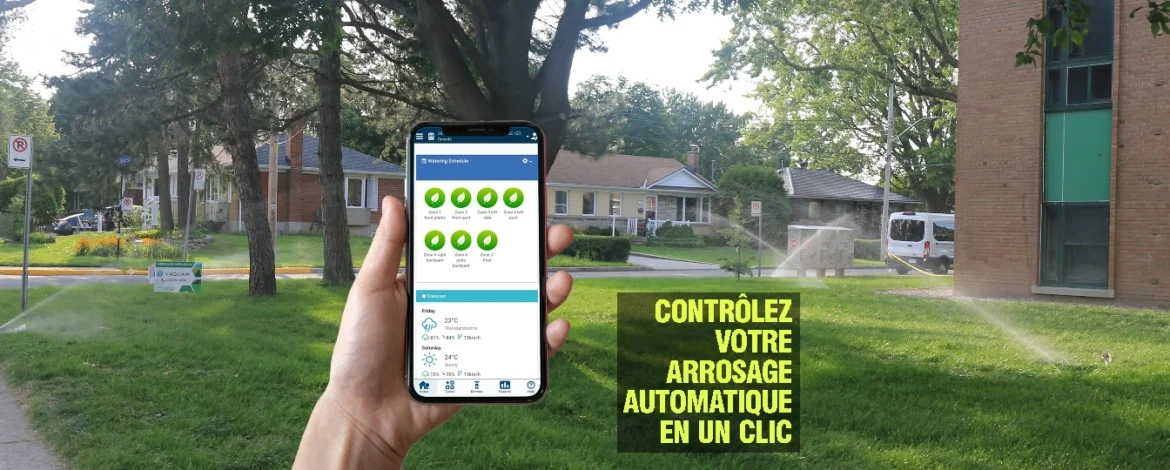In this article, we will delve into the world of smart irrigation controllers, exploring how they revolutionize water management with their advanced features and benefits. Smart irrigation controllers are the future of water conservation and efficient landscape maintenance. These devices combine cutting-edge technology with eco-consciousness, empowering users to easily control and optimize their water usage.
Understanding Smart Irrigation Controllers
Smart irrigation controllers, also known as smart sprinkler controllers, are innovative devices designed to automate and optimize the watering process for lawns, gardens, and landscapes. Unlike traditional irrigation systems that rely on manual timers or fixed schedules, smart controllers leverage real-time data, weather forecasts, and soil moisture levels to create customized watering schedules tailored to each specific landscape’s needs.
How Smart Controllers Work
Smart irrigation controllers are equipped with sensors and connected to Wi-Fi, allowing them to gather relevant information from various sources. Some of the key factors they consider include:
1. Weather Data
Smart controllers tap into local weather forecasts and historical data to determine upcoming weather conditions. By considering factors such as temperature, humidity, wind speed, and precipitation, these controllers adjust watering schedules accordingly. For example, if rain is expected, the controller may postpone irrigation to avoid unnecessary watering.
2. Soil Moisture
Embedded soil moisture sensors help smart controllers understand the moisture levels in the ground. By analyzing this data, the system can avoid overwatering or watering already saturated soil, promoting healthier plants and reducing water waste.
3. Plant Types
Different plants have varying water requirements. Smart controllers allow users to input the types of plants they have in their landscapes, and the system optimizes the watering schedule based on the specific needs of each plant species.
4. Watering Zones
Large landscapes may have different watering zones with diverse watering needs. Smart controllers segment these zones and apply precise amounts of water to each area, ensuring efficient irrigation.
Benefits of Smart Irrigation Controllers
Using smart irrigation controllers provides an array of advantages for both homeowners and commercial property managers:
1. Water Conservation
One of the most significant benefits of smart controllers is water conservation. By utilizing real-time data and intelligent scheduling, they can reduce water usage by up to 50% compared to conventional systems.
2. Cost Savings
By conserving water, users can also enjoy cost savings on their water bills. The initial investment in a smart controller is quickly offset by the reduction in water expenses over time.
3. Environmental Impact
Reducing water usage not only saves money but also contributes to environmental sustainability. Smart controllers play a crucial role in preserving water resources and promoting eco-friendly practices.
4. Healthier Landscapes
Smart controllers tailor watering schedules to the specific needs of plants, promoting healthier growth and minimizing the risk of overwatering or underwatering.
5. Remote Control and Monitoring
Most smart controllers come with mobile apps or web interfaces that allow users to control and monitor their irrigation systems remotely. This feature provides unparalleled convenience and flexibility, especially for those frequently away from their properties.
6. Easy Installation and Integration
Smart irrigation controllers are designed for user-friendly installation and seamless integration with existing irrigation systems, making the transition to smart technology smooth and hassle-free.
Choosing the Right Smart Controller
When selecting a smart irrigation controller, consider the following factors:
1. Compatibility
Ensure that the controller is compatible with your existing irrigation system and that it supports the required number of zones.
2. Connectivity
Check the controller’s connectivity options, such as Wi-Fi or Bluetooth, to ensure it aligns with your preferences and infrastructure.
3. Mobile App Features
Explore the features offered by the controller’s mobile app, such as remote access, scheduling adjustments, and data monitoring.
4. Brand Reputation
Research and opt for well-established brands known for their reliability and customer support.
Installation and Setup
Once you have chosen the right smart irrigation controller, follow the manufacturer’s instructions for installation and setup. Most controllers come with easy-to-follow guides that make the process straightforward.
In conclusion, smart irrigation controllers are indispensable tools for modern water management and landscape care. Their ability to intelligently optimize watering schedules, conserve water, and promote healthy plant growth sets them apart from traditional irrigation systems. By investing in a smart controller, you contribute to a greener and more sustainable future and benefit from cost savings and the convenience of remote control. Embrace the future of irrigation and embrace smart controllers for your landscaping needs.
#Arrosage #SmartIrrigation #WaterEfficiency #GardenTech #EnvironmentalSolutions #WaterConservation #Innovation #GardeningMadeEasy #HomeAutomation #GreenLiving #SustainableGarden #SmartHome #EfficientWatering #SaveWater #TechLovers #IrrigationSystem #GardenGoals #LawnCare #WaterSmart #EcoFriendly #PlantLovers #SaveMoney #HealthyGardens #SmartLiving #GardenInspiration #HomeAndGarden

